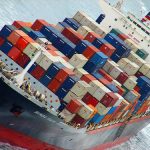Let the BlockChain Wars Begin in International Shipping

BlockChain Picture by: Wikimedia user Davidstankiewicz
There is so much potential for what blockchain technology can bring to the international shipping industry. So much potential, in fact, there’s a fight for who can successfully bring blockchain to the industry.
Major international shipping companies just threw their names in the blockchain ring this week.
CMA CGM, Cosco/OOCL, Evergreen, Yang Ming, DP World, Hutchison Ports, PSA, and Shanghai International Port have formed a blockchain consortium utilizing technology from CargoSmart, a shipping tech company owned by Cosco.
The consortium is developing a blockchain platform called Global Shipping Business Network (GSBN).
Those first four companies of the consortium listed above are some of the largest carriers in the international shipping industry, spanning two carrier alliances. Three of the carriers—CMA CGM, Cosco/OOCL, and Evergreen—are members of the Ocean Alliance. Pulling in Yang Ming might be a major coup, as that carrier is part of THE Alliance.
Just a little more than a week ago, we blogged about Maersk and IBM’s blockchain collaboration, TradeLens, stalling because of its failure to pull in other major carriers to the platform.
The only carrier other than Maersk that TradeLens has gotten onboard is Pacific International Lines (PIL). PIL isn’t exactly the biggest international shipping carrier in the world, though it is not insignificant. However, just last year, the Journal of Commerce published an article about PIL being the most likely carrier to be taken over next after the buyout of OOCL by Cosco.
That article does point out the strategic alliance PIL has with Cosco due to a vessel sharing agreement between the two carriers for transpacific trade. Perhaps Maersk and IBM thought they were closer to landing Cosco on their platform by getting PIL onboard with TradeLens.
Seeing Cosco join with three other major carriers to form a separate blockchain consortium must be a major disappointment for Maersk and IBM. In fact, from the outside, this blockchain consortium almost looks like backlash from the Maersk/IBM one.
Major carriers don’t want to join a blockchain platform owned by Maersk. Who would want to give a potential competitive advantage to one of their competitors? Especially a competitor that has set out to conquer the competition and declared the industry will shrink to only three global companies.
Launching this consortium with four major carriers is score one for GSBN over TradeLens. The last four companies—DP World, Hutchison Ports, PSA, and Shanghai International Port—are major terminal operators, which are great additions to the blockchain consortium as well.
However, the Maersk/IBM platform is not without its own advantages in this fight. For one, it has a head start. Maersk and IBM have been developing TradeLens since 2016, and the technology/platform itself appears fully ready to go. Who knows how much work and time GSBN will need to be ready. Despite their lack of carrier partners, Maersk and IBM have reportedly signed up about 100 other partners, including port authorities, customs authorities, freight forwarders, and logistics companies, to TradeLens.
It’s also important not to forget that TradeLens and GSBN are not the only names in international shipping blockchain platforms. There’s also Accenture with big industry players APL and Kuehne + Nagel onboard.
So it looks like we’re primed for a three-way battle between TradeLens, GSBN, and Accenture for bringing blockchain-based platforms to the international shipping industry.
Now there is the possibility that multiple blockchain platforms will be introduced to the industry and instead of competing with each other, they’ll network with each other. Such a cooperative outcome would probably be optimal for shippers, bringing a level of transparency to the industry never before seen.
However, when it comes to ocean freight, carriers have long resisted transparency and there is much uncertainty as to how the introduction of blockchain to this industry will play out. So…
Let the blockchain war begin.





Dear Jared ,
Thanks for the valuable journal
Dear Jared, thanks for the article!
any idea what is the status of BlockChain platforms usage in the industry? something is still tested or already gone live? thank you.